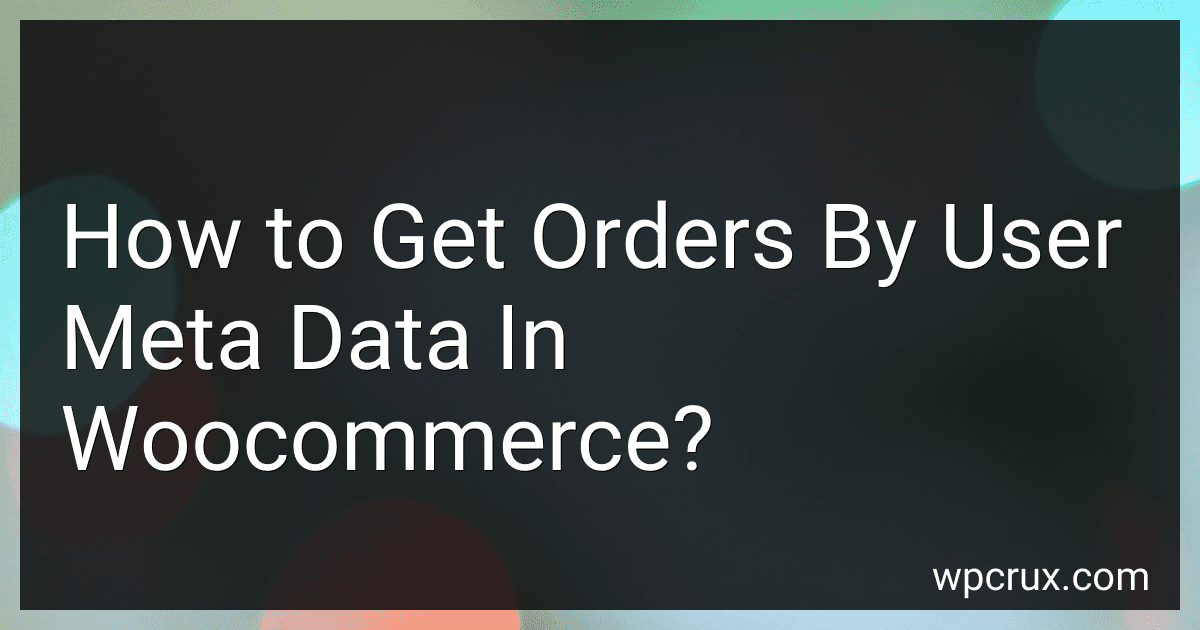Best Plugins to Buy in October 2025

The Ultimate WordPress & WooCommerce Handbook: From Setup to Success in Online Selling



WordPress WooCommerce: Tienda online con WooCommerce (Spanish Edition)



Building E-Commerce Solutions with WooCommerce - Second Edition



WordPress WooCommerce: Webshop met WooCommerce (Dutch Edition)



Formation Woocommerce: Créer et exploiter une boutique en ligne (French Edition)



Setting Up and Running an Online Store


To get orders by user meta data in WooCommerce, you need to use the WP_Query class to query the orders based on the user meta data. You can use the meta_query parameter to specify the user meta data you want to search for, and then use the author parameter to only get orders belonging to a specific user. The code snippet below shows an example of how you can get orders by user meta data:
$args = array( 'post_type' => 'shop_order', 'posts_per_page' => -1, 'author' => $user_id, 'meta_query' => array( array( 'key' => 'your_user_meta_key', 'value' => 'your_user_meta_value', 'compare' => '=' ) ) );
$orders = new WP_Query($args);
while ($orders->have_posts()) { $orders->the_post(); // Display or process the order data here }
wp_reset_postdata();
Replace your_user_meta_key and your_user_meta_value with the actual user meta data key and value you want to search for. Make sure to replace $user_id with the ID of the user you want to get orders for. This code will retrieve all orders that belong to the specified user and have the specified user meta data.
What is the process of extracting orders by user meta data in Woocommerce?
To extract orders based on user meta data in Woocommerce, you can follow these steps:
- Identify the user meta data that you want to use as a filter for extracting orders. This could be any custom user meta field that is relevant to your use case.
- Use the WP_Query class to query the WooCommerce orders based on the user meta data. You can use the 'meta_query' parameter to specify the user meta data you want to filter by.
- Create a new instance of WP_Query with the appropriate parameters. Here's an example code snippet to extract orders based on a custom user meta field called 'age':
$args = array( 'post_type' => 'shop_order', 'meta_query' => array( array( 'key' => 'age', 'value' => '30', // Filter orders where the user's age is 30 'compare' => '=' ) ) );
$query = new WP_Query( $args );
// Loop through the results if ( $query->have_posts() ) { while ( $query->have_posts() ) { $query->the_post(); // Access order data } }
- Customize the query parameters as per your requirements. You can add multiple meta queries to the 'meta_query' parameter to filter orders using multiple user meta data fields.
- Execute the query and iterate through the results to access order data based on the filtered user meta data.
By following these steps, you can extract orders based on user meta data in Woocommerce using custom queries.
How to export orders based on user meta data in Woocommerce?
To export orders based on user meta data in WooCommerce, you can follow these steps:
- Go to your WordPress admin dashboard and navigate to WooCommerce > Orders.
- Click on the "Export" button at the top of the Orders page.
- In the export options window, select the data you want to export, such as order data, billing data, shipping data, etc.
- Scroll down to the "Advanced Options" section and tick the checkbox next to "User Meta Data".
- Click on the "Generate CSV" button to export the orders based on user meta data.
- You can download the CSV file and open it in a spreadsheet program like Excel to view and analyze the data.
By following these steps, you will be able to export orders based on user meta data in WooCommerce.
How to query orders based on specific user meta data in Woocommerce?
To query orders based on specific user meta data in Woocommerce, you can use the following code snippet:
$args = array( 'numberposts' => -1, 'post_type' => wc_get_order_types(), 'meta_query' => array( 'relation' => 'AND', array( 'key' => 'your_meta_key', 'value' => 'your_meta_value', 'compare' => '=' ) ) );
$orders = wc_get_orders( $args );
foreach ( $orders as $order ) { // Do something with the order $order_id = $order->get_id(); }
Replace 'your_meta_key' and 'your_meta_value' with the specific user meta data key and value you want to query the orders by. This code snippet will retrieve all orders that have a user meta data matching the provided key and value. You can also add additional meta queries as needed by adding more arrays within the 'meta_query' parameter.
